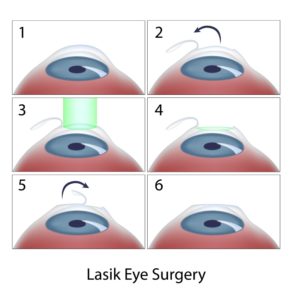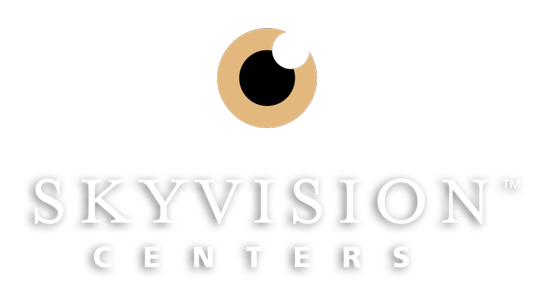Are you tired of wearing contact lenses or glasses? Is there something you do, work or play, that would be easier or more fun WITHOUT WEARING GLASSES OR CONTACT LENSES? Well, if you live in Cleveland, Ohio your best option might be LASIK!

LASIK involves the use of a very special type of laser, the EXCIMER LASER. Its original use was developed by IBM to etch patterns on microchips!
LASIK has become the treatment of choice for many patients because they recover so quickly and typically have very few, if any, side effects or complications. In fact, most LASIK patients notice an improvement in their vision right when they sit up after the surgery!
The Laser Vision Correction Process
Before The Surgery
Who is a good lasik candidate?
A comprehensive complimentary consultation is conducted prior to a Laser Vision Correction (LVC) procedure to determine whether or not you are a good candidate. Prior to your consultation, if you are a contact lens wearer, you will need to leave your contact lenses out and wear glasses for a time determined by contact lens type.
Surgery Day
Upon arriving at the laser center, you may have additional pictures of your eyes taken.
Videos about Lasik and PRK are provided here for your viewing:
LASIK surgery is painless and the entire LASIK procedure will take about 15-20 minutes. The laser itself will actually only be used for less than a minute and before the procedure the doctor will give you anesthetic eye drops so you don’t feel the procedure.
Dr. Darrell White will greet you along with his specially trained laser technician(s) who will guide you through your experience. After your lasers (Lasik or PRK) are complete you will have a quick examination, and then our laser coordinator will give you detailed instructions on what’s next!
The most important thing to do is go home and TAKE A NAP!! Don’t forget to have someone with you to drive you home after your laser.
POST-OPerative
Whether you have LASIK or PRK you will have medicated eye drops to take after your surgery. Immediately after the procedure a Laser Coordinator will go over your post-operative instructions and send you home with written instructions.
We see all of our patients on the day immediately following surgery for both LASIK and PRK and one of our SkyVision doctors will examine your eyes. Your personalized schedule of eyedrops will be reviewed with you by the doctors and technicians.
In general, Laser Vision Correction patients are seen for post-op visits on day one, at one to two weeks, three months, six months, and one year after surgery. PRK patients are seen a little bit more frequently, especially in the early days following laser. If you have had PRK you may continue to use some of your drops for a few months to enhance your healing.
At SkyVision we’ve found that ultraviolet light protection is very important after surgery. A good pair of sunglasses that blocks UV light should be worn at all times when you are outside whether you have had LASIK or PRK. We are particular fans of Maui Jim sunglasses for both vision quality and UV light protection. Ask your SkyVision doctor for a personal recommendation.
Frequently Asked Questions
Does it hurt?
LASIK is, generally, a painless procedure. After having been well informed as to what to expect during your procedure, fear of the unknown is reduced. You do have the option of a mild sedative which helps to alleviate anxiety, and combined with the local anesthetic (eye drops) used to completely numb your eye, very little is felt during surgery. The more common complaints are a general pressure sensation on the eyelids from the instruments used to hold your eye open, AND a pressure sensation on the eye. The advantage to LASIK is that there is little, if any discomfort in the healing process as you experience a rapid return to vision.
With the PRK procedure, some discomfort is common in the first three to five days that follow surgery. Because of the difference in the treatment of the cornea, the healing process for PRK is slower, as is the visual recovery. During the initial phase of your healing, a bandage contact lens is worn to increase comfort and speed healing. This lens has no power and generally has no effect on your vision.
Can I have both eyes done at the same time?
Yes. Having bilateral LASIK is common and has many advantages. Aside from the scheduling convenience (for both your home and work), having both eyes done maintains balance.
How long do I have to keep my contact lenses out?
Prior to your consultation and surgery at SkyVision Centers, your contact lenses must remain out of your eyes for an extended period of time determined by lens type. While our time requirement may seem more extreme than that of other centers, we feel the longer you are out of your lenses, the more accurate our measurements and the better your outcome. Contact lenses of all types reshape the cornea, sometimes permanently.
Soft lenses (this includes daily, extended wear, and Toric lenses for astigmatism) are to be kept out of your eyes for one week.
Gas Permeable lenses should be kept out of your eyes a minimum of one month. Usually, gas perm wearers have worn these lenses for years. If this is true in your case, additional time without the lenses may be needed (usually one additional week for every decade of use).
Hard lenses, though extremely rare anymore, may require three to six months of non-use.
PRK is also generally done both eyes on the same day as well.
Will I ever need glasses again?
Yes. LASIK and PRK do not stop the aging process of the eyes and cannot prevent eye disorders and diseases. Aging brings about the normal process of presbyopia which creates blurred near vision. Other issues related to age like cataracts can also bring about a need for glasses until corrective surgery is deemed appropriate (LASIK and PRK do not cause cataracts).
What can go wrong?
Laser Vision Correction is a very successful procedure, hence, its popularity. It is, however, surgery and not without risks, complications and/or negative side effects. Most common are dry eye issues, halo/glare or night vision problems, and flap complications. It is very important to discuss with your doctor and staff your expectations and the risks involved with LASIK or PRK.
How soon will I be able to see? How soon will I be able to drive? How soon will I be able to return to work?
All the answers to these questions depend upon your individual healing process and the type of surgery you have had. LASIK offers a rapid return to good vision. Most patients are able to drive themselves to their post operative visit the following day. Depending upon your work environment (not dusty or debris ridden), most patients return to work or normal routine right after their one day post operative appointment is done. PRK patients may need to arrange for a driver as long as three days out from surgery. The return to work is determined by how quickly you feel you have functional vision, usually 3 days or so after your procedure.
What is included in the fee? I’ve heard of people needing surgery again. Is this true?
Yes. Some patients may experience a regression of vision. They may slide backwards from their optimum, 20/20 for example, to 20/40 (still legal driving vision) or needing glasses again. They may fall to a functional vision, but desire an enhancement to sharpen what has occurred in the healing process. Some patients may be undercorrected, and some opt for monovision, a surgical choice to aid the presbyopic process, and change their minds. An enhancement is a second surgery. It is not usually done sooner than six months after the initial procedure, even if indicated during the initial post operative visits, to ensure your vision has stabilized. These are included in the fee at no charge for the first 12 months after the initial surgery.
The fee also includes all visits after surgery related for one year. If an enhancement is needed beyond the 12 month period a fee applies.
Does my insurance cover laser surgery? How do I pay?
Laser Vision Correction is not a covered expense under a medical insurance policy. If you have vision insurance coverage, check the details of your policy. There are a few company’s that offer a discount. Some of the more popular one’s in the Northeast Ohio area are VSP and EyeMed. Do not hesitate to contact us at 440-892-3931 for help with this or any other questions.
Our patients pay for their procedures in a variety of ways. SkyVision Centers accept most major credit cards. We also offer No-Interest financing plans through Care Credit. You can apply online via our website, or receive information from our coordinator to contact them directly. Other options may include benefits from your employer. Some companies offer an FSA “flex accounts” or “cafeteria plans” which help their employee save for a procedure by deductions from your paycheck prior to taxes. If you have one of the new HSA or Health Savings Plans you may be able to use these funds to pay for your LASIK. You may want to check with your employer regarding particular requirements and deadlines for your plan.
How long does a LASIK or PRK procedure take?
You can expect to be at the facility usually one to two hours. The total time in the surgery suite is about ten to fifteen minutes and the actual laser time is less than one minute per eye. Most of the visit is preparation and discussion.

